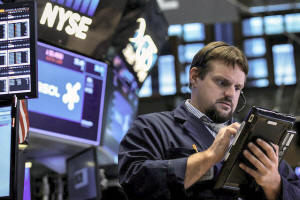|
Dollar hits low note
while euro shines; storms stoke worry in U.S.
 Send a link to a friend
Send a link to a friend
 [September 09, 2017]
By Hilary Russ [September 09, 2017]
By Hilary Russ
NEW YORK (Reuters) - Reduced expectations
for another U.S. Federal Reserve interest rate hike this year helped
drive down the dollar to its lowest in more than 2-1/2 years on Friday
and kept gold near a one-year high.
The euro hit multi-year peaks in the wake of a European Central Bank
meeting, while U.S. crude oil prices tanked more than 3 percent as
powerful Hurricane Irma roared toward Florida.
Stubbornly weak inflation continues to surprise Fed policymakers. In a
speech on Thursday, New York Fed President William Dudley did not repeat
an assertion from three weeks ago that he expects to raise rates once
more this year.
Also dampening the dollar and lowering the chances of another rate hike
was an agreement in Congress to push U.S. debt ceiling talks three
months down the road to December, coinciding with the Fed's policy
meeting.
Against a basket of other major currencies, the dollar index <.DXY> was
down 0.38 percent after touching a low of 91.011, its weakest since
January 2015.
The safe-haven Japanese yen <JPY=> also strengthened 0.61 percent versus
the greenback at 107.80 per dollar, and the euro <EUR=> rose 0.12
percent to $1.2036.

The euro's rally built on ECB President Mario Draghi's suggestion that
it may begin tapering its massive stimulus program this fall.
Draghi referred several times Thursday to the euro's strength and said
it was the main reason for a cut in the bank's 2018-19 inflation
forecasts. He also indicated any winding down of its massive stimulus
program was likely to be slow.
Those comments did little to deter euro bulls, however, and a Reuters
report that central bank officials were in broad agreement that their
next step would be to reduce their bond purchases also supported the
currency.
The ECB "left the mystery out there" with regard to tapering, said Greg
Anderson, global head of foreign exchange strategy at BMO Capital
Markets in New York. "It creates a feeding frenzy, and the momentum that
was there (in the euro) gets accelerated."
Oil prices fell sharply on worries that energy demand would be hit by
Irma, one of the most powerful storms to near the United States in a
century, as it barreled toward Florida and the U.S. Southeast.
[to top of second column] |

A trader works on the floor of the New York Stock Exchange (NYSE) in
New York, U.S., September 8, 2017. REUTERS/Brendan McDermid

Irma is the second major storm to threaten the United States in two weeks after
Hurricane Harvey shut a quarter of U.S. refining capacity and 8 percent of U.S.
oil production.
"Hurricanes can have a lasting effect on refinery and industry demand," said
Eugen Weinberg, head of commodities research at Commerzbank in Frankfurt.
U.S. crude <CLcv1> fell 3.12 percent to $47.56 per barrel and Brent <LCOcv1> was
last at $53.76, down 1.34 percent.
Economists have said Harvey could weigh on U.S. economic growth in the third
quarter.
Spot gold <XAU=> was down 0.2 percent to $1,346.52 an ounceafter hitting
$1,357.54, its highest since August 2016. It was up 1.7 percent this week,
notching a third consecutive weekly gain.
U.S. shares were mixed, with the S&P ending slightly lower as investors braced
for Irma and fretted that Pyongyang could launch another missile test on
Saturday, North Korea's founding day, keeping risk appetite in check going into
the weekend.
The Dow Jones Industrial Average <.DJI> rose 13.01 points, or 0.06 percent, to
end at 21,797.79, the S&P 500 <.SPX> lost 3.67 points, or 0.15 percent, to
2,461.43 and the Nasdaq Composite <.IXIC> dropped 37.68 points, or 0.59 percent,
to 6,360.19.
Stocks elsewhere were slightly higher.
The pan-European FTSEurofirst 300 index <.FTEU3> rose 0.17 percent and MSCI's
gauge of stocks across the globe <.MIWD00000PUS> edged up 0.01 percent.
The U.S. 10-year Treasury yield fell to a 10-month low of 2.016 percent but then
rose, with the benchmark notes last up 2/32 in price to yield 2.0559 percent.

(Additional reporting by Sam Forgione, Gertrude Chavez-Dreyfuss, Julia Simon and
Lewis Krauskopf and Caroline Valetkevitch in New York; Editing by Nick Zieminski
and James Dalgleish)
[© 2017 Thomson Reuters. All rights
reserved.] Copyright 2017 Reuters. All rights reserved. This material may not be published,
broadcast, rewritten or redistributed. |